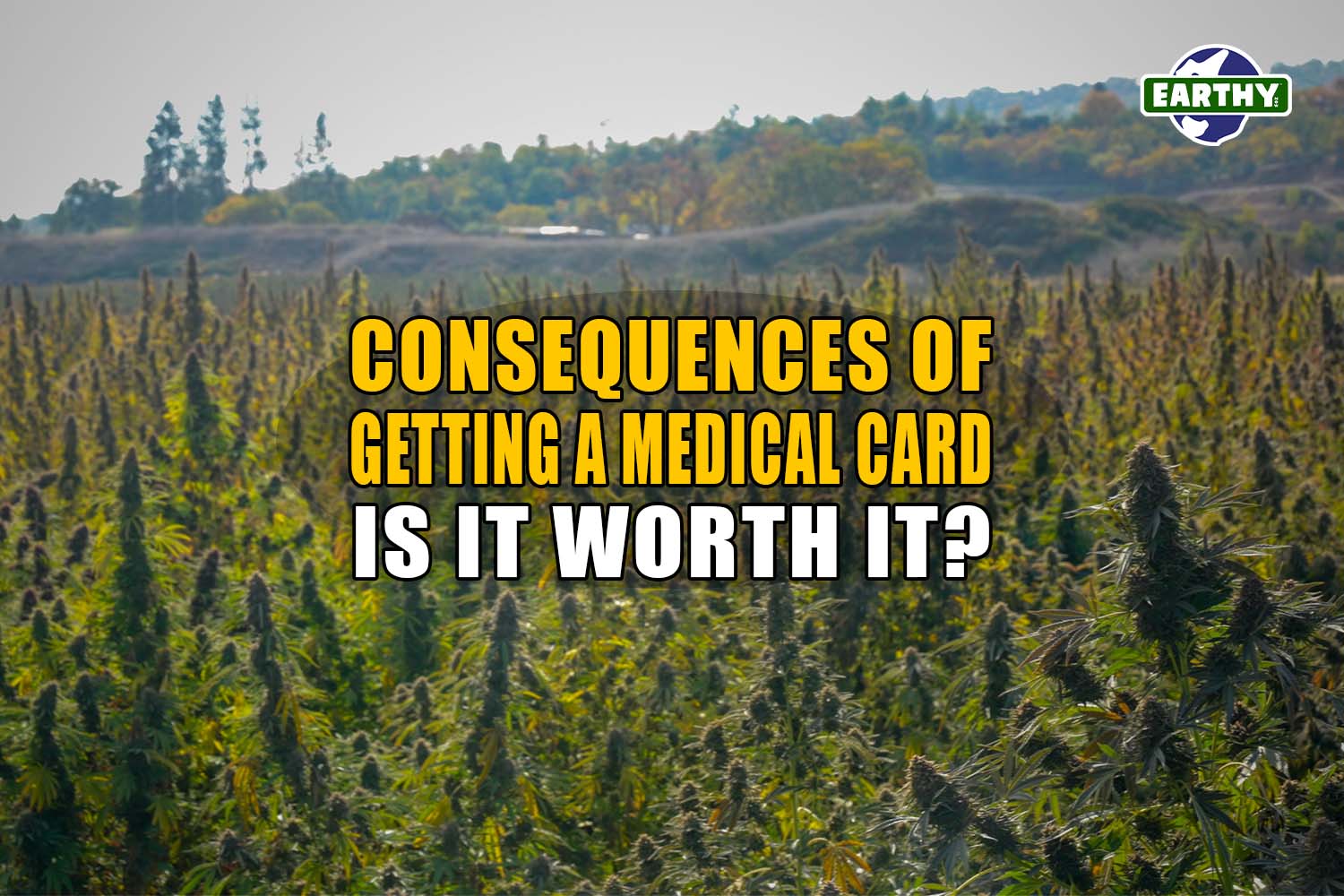The use of medical cannabis has become increasingly prevalent as more states legalize it for medical purposes. As a result, many patients consider obtaining a medical cannabis card to purchase marijuana legally to help address a qualifying health condition. This article explores the benefits, potential drawbacks, and overall value of getting a medical card.
What is a medical card?
A medical cannabis card, sometimes referred to as a medical marijuana card, is a state-issued identification card used by patients to obtain medical cannabis for the treatment medical conditions. Since each state is permitted to have its own cannabis laws, these cards are issued to qualified patients who meet the specific criteria of a particular state’s medical cannabis program [1].
Types of medical cards
Medical cards can vary depending on the state and the specific medical cannabis program. For example, common types include patient cards and caregiver cards. Each type serves a different purpose within the medical cannabis framework and gives patients access to cannabis if they have qualifying conditions [2].
The Role of Cannabis in Modern Medicine
Eligibility criteria
To obtain a medical card, individuals must have a qualifying medical condition. For instance, common conditions include multiple sclerosis, amyotrophic lateral sclerosis (ALS), Crohn’s disease, intractable pain, and other conditions that cause severe symptoms. Notably, a recommending physician must certify that the patient has one of these or other conditions and would benefit from the medical use of cannabis products [3].
Benefits of getting a medical card
Access to safe cannabis products
One of the primary benefits of getting a medical cannabis card is the legal protection it provides for purchasing and possessing cannabis. For instance, patients can access high-quality, regulated cannabis products from licensed dispensaries. As a result, individuals receive safe and potentially effective cannabis tailored to their specific needs [4].
Cost savings
Medical cannabis recipients often benefit from cost savings, including tax exemptions on cannabis products. Also, some insurance plans may cover part of the cost of medical cannabis, further reducing expenses. Additionally, medical cannabis recipients may receive discounts or special pricing at dispensaries [4].
How CBD Oil Can Improve Your Pet’s Wellness
Enhanced medical care
Medical cannabis patients may receive personalized treatment plans developed by healthcare practitioners. These plans consider the patient’s specific medical conditions and symptoms, ensuring potentially effective and targeted treatment. In addition, patients may have access to specialists who can provide additional support and guidance [4].
Full-Spectrum CBD Gummies and Sleep Enhancement
Potential drawbacks and consequences
Legal and employment issues
Although medical cannabis is legal in many states, marijuana remains a controlled substance at the federal level. As a result, this discrepancy can create legal challenges for medical cannabis patients, particularly regarding employment. For example, some employers may discriminate against employees who use medical cannabis, even if they have a valid medical card [5].
Insurance implications
Obtaining a medical cannabis card may impact life insurance and health insurance premiums. For example, some insurers may view medical cannabis use as a risk factor, potentially leading to higher premiums or denial of coverage [5].
Social stigma
Despite growing acceptance, social stigmas associated with medical cannabis use still exist. Therefore, medical cannabis patients may face judgment or misunderstanding from family, friends, and the public. This can impact personal relationships and quality of life [5].
Impact on lifestyle and daily activities
Travel restrictions
Medical cannabis patients must be aware of travel restrictions. While their medical card is valid within their state, it may not be recognized in other states or countries. As a result, patients who need to travel with their medication may face challenges [6].
Impact on driving and operating machinery
As a rule, patients must be cautious about driving or operating heavy machinery while using medical cannabis. Indeed, legal restrictions and safety considerations require patients to ensure they are not impaired while performing such activities [7].
Examination of Cannabis for Skin Conditions
Financial considerations
Initial costs
The initial costs of obtaining a medical card include application fees and medical consultation fees. These fees vary by state and can burden some patients financially [8].
Ongoing costs
It’s important for patients to consider the ongoing costs of medical cannabis products, such as renewal fees for their medical card and the cost of medication. While some patients may benefit from discounts, the overall expense can still be significant [8].
Case studies and testimonials
Positive experiences
Many medical cannabis patients report significant improvements in their quality of life. For example, patients with multiple sclerosis or Crohn’s disease have reported reduced pain and improved symptoms, allowing them to lead more active lives [9, 10]. However, cannabis is not FDA-approved for these conditions. Thus, patients with these and other conditions must always consult a physician and approach medical cannabis with caution.
Cannabis and Fibromyalgia: What the Research Says
Negative experiences
Conversely, some patients have had negative experiences, such as difficulties in obtaining their medical cards or facing discrimination [5]. These cases highlight the importance of understanding the potential drawbacks before getting a medical card.
Lessons learned
Patients and caregivers can learn valuable lessons from others’ experiences. These stories provide insights into the benefits and challenges of medical cannabis use and can help others make informed decisions.
Alternatives to medical cards
Over-the-counter options
Patients may explore over-the-counter cannabis options for wellness or symptom management. For example, many dispensaries, like Earthy Now, offer hemp-derived cannabis products for a multitude of tastes and needs. These can purchased without the need for a medical card.
Premium high-CBD, low-THC products delivered privately to your door
For cannabis enthusiasts seeking reliable, trustworthy sources of hemp-derived products, Earthy Now has something for everyone. These products are the industry’s cleanest and strongest, with only trace amounts of Delta-9 THC (no more than 0.3%). As always, Earthy Now provides the optimal balance of cannabinoids while ensuring high CBD and low Delta-9 THC levels. As a result, customers report various beneficial effects, from clear-headed alertness and energy to relaxation.
Explore these natural products from Earthy Now to boost overall wellness:
- CBD Flower
- Gummies
- Lozenges
- Tablets (THC Free!)
- Soothing Relief Lotion
- Soothing Relief Salve
- Oils
- Pet Products (THC Free!)
- Pre-Rolls
- Smokes
- Terpenes
Holistic and natural remedies
Other holistic and natural remedies, such as acupuncture, herbal supplements, and lifestyle changes, can help some patients with various conditions. These options may offer relief without the legal and financial implications of medical cannabis.
Lifestyle changes
Additionally, lifestyle changes, including diet, exercise, and stress management, can be crucial in managing symptoms of chronic medical conditions [11]. Thus, patients might consider these options in conjunction with or as an alternative to medical cannabis or traditional medications.
Government resources
State and federal government websites provide detailed information on medical cannabis programs, eligibility criteria, and legal considerations. These resources are valuable for understanding the registration process and requirements [3].
Patient advocacy groups
Patient advocacy groups offer support, information, and resources for medical cannabis patients. These organizations can provide guidance and assistance throughout the process of obtaining and using a medical cannabis card [12].
Key takeaway: Should I get a medical marijuana card?
The decision to obtain a medical card is a personal one that requires careful consideration of the benefits and potential drawbacks. While medical cannabis may provide significant relief for qualifying medical conditions, patients must weigh the legal, financial, and social implications. For many, the benefits of improved health and quality of life outweigh the potential consequences, making it a worthwhile option. Ultimately, patients should consult with their healthcare practitioners and thoroughly research their state’s medical cannabis program before making a decision.
Visit Earthy Now to explore premium cannabis products available without a medical card, including gummies, flower, topicals, and more!
Medical Disclaimer / Legal Disclaimer – Information is provided for educational purposes. It does not and is not intended to constitute legal advice or medical advice. We attempt to be accurate and up-to-date, but the legality of cannabinoids and the science of cannabis are evolving. The author is neither a legal professional nor a medical expert. Before buying or using any products, you should check with your local authorities and medical providers.
References
- Wikipedia: Medical Cannabis Card
- Registry Identification Cards
- How to Get a Medical Cannabis Card in Your State
- Discover the Benefits of Having a Medical Marijuana Card in States With Recreational Cannabis
- The Pros and Cons of Getting a Medical Card
- Can You Travel with Medical Marijuana? Everything You Need to Know
- Legal Marijuana and Heavy Equipment
- Does It Make Financial Sense to Get a Medical Card?
- Marijuana Use by Patients with Multiple Sclerosis
- Evidence Supporting the Benefits of Marijuana for Crohn’s Disease
- Effects of Exercise and Diet on Chronic Disease
- Cannabis Patient Advocacy Association
- Qualifying Conditions For Medical Marijuana




 Earthy Now
Earthy Now